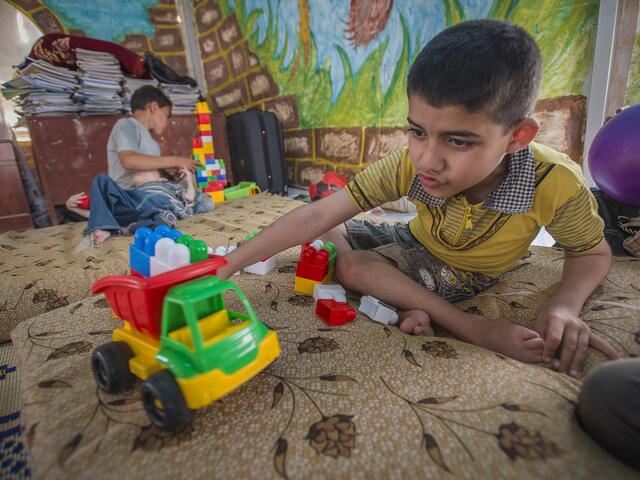If you’re a refugee child, your chances of going to school are slim. If you also have a disability, it’s even more unlikely.
84% of Syrian children with disabilities are not going to school. That’s 4 out of 5 missing out on vital education that has the potential to transform their lives.
Without an education, a child is stripped of their opportunity to achieve their goals and live their life to the full. Education is empowerment – and for those living with disabilities, going to school becomes even more crucial for their future. It is unclear just how many children in Syria have been left with physical and psychological disabilities because of the war. What we do know is that 7 years of war prevented children from accessing schools, hospitals and services that they need.

And for those Syrian children who have been able to flee conflict – many aren’t receiving an education when they arrive in a new country. In Lebanon alone, 40% of child refugees are not going to school, leaving many at risk of child labour.
This week, the largest ever gathering of people with disabilities, governments, charities and business leaders came together for the Global Disability Summit, providing an important opportunity to offer solutions. At the International Rescue Committee, we’re committed to making sure every child can be given the opportunity to survive and thrive. Here’s three ways we’re turning that mission into action:
- Providing inclusive education that tackles stigma: our education programme with Sesame Workshop provides early childhood education to children in the world’s most conflicted regions. Delivered through television, mobile phones, and direct services in homes and pre-schools in Syria, Iraq, Lebanon, and Jordan, Sesame Seeds gives young children - regardless of their gender, disability or nationality - the language, reading, maths, and socio-emotional skills they need to succeed in school and later in life. The programme also challenges harmful attitudes towards disability in its content by including characters with disabilities so that children gain respect and understanding for children with disabilities.
- Making buildings and schools accessible for people with disabilities: we take expert knowledge from partner organisations to make sure our programmes are as inclusive as possible. This means we take time to ensure ramps, pathways and railings are in place so people using wheelchairs can get access to our services.
- Setting targets so that people with disabilities aren’t left behind: we ensure that at least 10% of the people we help with economic support, either through cash relief or training to get into work, are people with disabilities.
Too often, people living with disabilities are left out of the conversation, as the world’s attention switches on following the Global Disability Summit, we have an opportunity to take action. Now is the time.